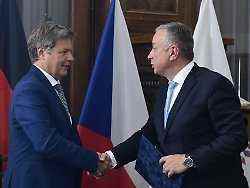Habeck promotes solidarity
How can the EU deal with the gas crisis?
07/11/2022, 8:12 p.m
A Russian gas delivery stop could shake the economy of numerous European countries. In the event of such a crisis, the EU states should not only take care of their own supply, warns Economics Minister Habeck. Instead, solidarity is required.
Federal Minister of Economics Robert Habeck is traveling to Prague and Vienna to discuss security of supply during the war in Ukraine. In winter, high bills, cold apartments and a full-blown economic crisis threaten. European solidarity could at least provide some relief.
Why is European solidarity in gas supply important?
Should the gas supply actually become so scarce in the coming winter that gas has to be rationed, this would lead to a “serious economic crisis in Europe and in Germany,” warns Habeck. In order to prevent this, “decisive, joint and solidary, but above all very quick action is needed”.
If states were to “agree” instead and only worry about their own security of supply, this would “not do justice at all to European reality,” said the Green politician. “An economic crisis in Germany is a European economic crisis, and a collapse of the European internal market damages the German economy.” Europe has grown together into a “community of destiny”.
What about the gas supply in Germany and Europe?
The fill levels in European gas storage facilities are currently rising. Overall, the gas storage facilities in the EU are currently around 61.6 percent full, Germany is slightly above average at just under 64 percent. The EU wants to reach 80 percent by November 1st. However, there are major differences between the countries: while Portugal, for example, has completely filled its storage facilities, the storage facilities in Bulgaria and Croatia are only 36.7 and a good 37 percent full, respectively.
Do countries in Europe have to show solidarity?
In addition to pure self-interest, the EU also urges its member states to show solidarity. In extreme cases, EU states are obliged to sell gas to other states in order to cover the “essential needs” of customers protected by “solidarity”. The European Gas Ordinance refers here in particular to private customers, but the healthcare system, basic social services and emergency and security services can also be covered by this definition.
According to the regulation, this solidarity mechanism is to be implemented in concrete terms by the member states among themselves by enacting appropriate “technical, legal and financial regulations”. According to the EU Commission, Germany has so far concluded such solidarity agreements with Denmark and Austria.
According to Habeck, this should not be the end of it. “For months I’ve been campaigning for us to sign even stronger solidarity agreements,” he says. In addition to Austria and the Czech Republic, the minister also referred to the neighboring countries of Poland and France. “Key points” were also recorded with neighboring countries in Eastern and South-Eastern Europe. “We are committed and dependent on solidarity here.”
What other European solidarity measures are there?
The solidarity mechanism of the EU gas regulation is “a last resort, to be used only in emergencies and under limited circumstances”. With a solidarity approach, however, the EU is trying to use the united European economic power to its advantage already when purchasing gas: The EU energy procurement platform created in March brings all member states together to jointly procure gas, liquid gas and hydrogen.
In this way, the EU’s negotiating power is to be used optimally – an overbidding competition between the EU member states in view of the low gas supply volumes, which would further drive up the prices, is to be prevented as a matter of urgency. A reliable supply at stable prices should also be secured by bundling demand. A more efficient use of the European gas infrastructure should also be achieved in this way.
